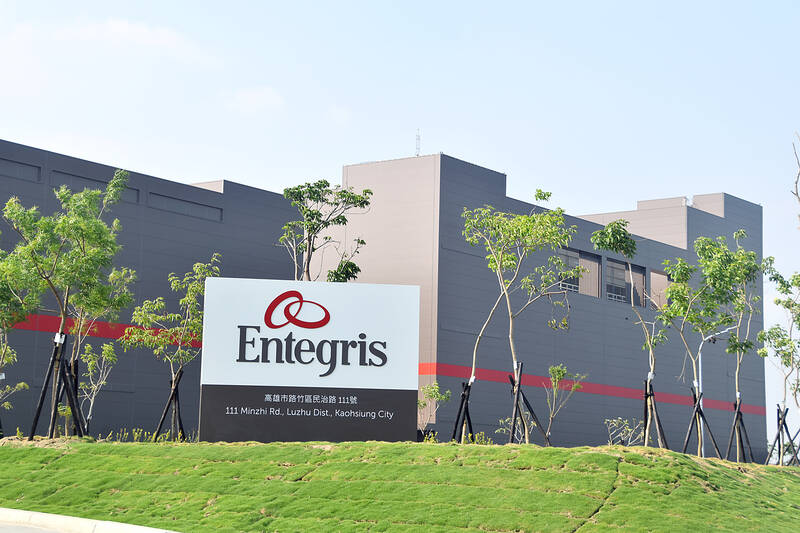Entegris Inc, a supplier of advanced materials and process solutions for the semiconductor and other high-technology industries, yesterday held an opening ceremony in Kaohsiung for its largest manufacturing facility that would produce advanced products such as liquid filters that can be used in 2-nanometer process technology.
The US-based company expects to recruit more than 400 employees for the new facility by 2025, when the US$500 million plant becomes fully operational. The company employs 720 people in Taiwan.
The Kaohsiung factory is forecast to generate US$500 million per year when it is fully utilized, the company said.

Photo: Su Fu-nan, Taipei Times
There is potential for the company to further expand and invest in land adjacent to the fab, it said.
Entegris said it would not scale back investment on research-and-development efforts, nor on capital spending during downturns.
It also operates a research-and-development center in Hsinchu.
“Our new Kaohsiung facility demonstrates our commitment to serving our customers in Asia and supporting the local industry ecosystem,” Entegris chief executive officer Bertrand Loy said. “The expansion of our footprint here helps us provide greater supply security and shorter lead times to customers across the region.”
The Kaohsiung facility is expected to add 20 percent capacity for three major products, including advanced liquid filters, the company said.
Regarding whether Entegris factored in the geopolitical risks in building an advanced factory in Taiwan, Loy said: “There is a lot of nervousness around that... The grand opening of our Kaohsiung facility, it is really a statement of the company’s commitment” to Taiwan.
“We want to be adequately positioned to support our customers in Taiwan and their ecosystem,” Loy said.
Entegris counts Taiwan Semiconductor Manufacturing Co (TSMC, 台積電) as one of its largest customers in Taiwan.
The new Kaohsiung fab is to produce Entegris’ next-generation products for TSMC and its customers in Taiwan, the company said.
The liquid filters made at the fab can be used in 28-nanometer nodes and can be further miniaturized for 5-nanometer, 3-nanometer and 2-nanometer technology nodes, which extreme ultraviolet lithography tools would use, Entegris said.
The company expects the global semiconductor industry would touch bottom this quarter, Loy said.
However, the pace of recovery remains to be seen, he added.
Entegris has been working with local customers and partners in the ecosystem for the past 32 years, during which Taiwan’s semiconductor industry has expanded at an annual compound growth rate of 16 percent, the company said.
Taiwan, in particular, has a dominant position in the world, with a 65 percent market share, it added.

Nvidia Corp’s demand for advanced packaging from Taiwan Semiconductor Manufacturing Co (TSMC, 台積電) remains strong though the kind of technology it needs is changing, Nvidia CEO Jensen Huang (黃仁勳) said yesterday, after he was asked whether the company was cutting orders. Nvidia’s most advanced artificial intelligence (AI) chip, Blackwell, consists of multiple chips glued together using a complex chip-on-wafer-on-substrate (CoWoS) advanced packaging technology offered by TSMC, Nvidia’s main contract chipmaker. “As we move into Blackwell, we will use largely CoWoS-L. Of course, we’re still manufacturing Hopper, and Hopper will use CowoS-S. We will also transition the CoWoS-S capacity to CoWos-L,” Huang said

Nvidia Corp CEO Jensen Huang (黃仁勳) is expected to miss the inauguration of US president-elect Donald Trump on Monday, bucking a trend among high-profile US technology leaders. Huang is visiting East Asia this week, as he typically does around the time of the Lunar New Year, a person familiar with the situation said. He has never previously attended a US presidential inauguration, said the person, who asked not to be identified, because the plans have not been announced. That makes Nvidia an exception among the most valuable technology companies, most of which are sending cofounders or CEOs to the event. That includes

INDUSTRY LEADER: TSMC aims to continue outperforming the industry’s growth and makes 2025 another strong growth year, chairman and CEO C.C. Wei says Taiwan Semiconductor Manufacturing Co (TSMC, 台積電), a major chip supplier to Nvidia Corp and Apple Inc, yesterday said it aims to grow revenue by about 25 percent this year, driven by robust demand for artificial intelligence (AI) chips. That means TSMC would continue to outpace the foundry industry’s 10 percent annual growth this year based on the chipmaker’s estimate. The chipmaker expects revenue from AI-related chips to double this year, extending a three-fold increase last year. The growth would quicken over the next five years at a compound annual growth rate of 45 percent, fueled by strong demand for the high-performance computing

TARIFF TRADE-OFF: Machinery exports to China dropped after Beijing ended its tariff reductions in June, while potential new tariffs fueled ‘front-loaded’ orders to the US The nation’s machinery exports to the US amounted to US$7.19 billion last year, surpassing the US$6.86 billion to China to become the largest export destination for the local machinery industry, the Taiwan Association of Machinery Industry (TAMI, 台灣機械公會) said in a report on Jan. 10. It came as some manufacturers brought forward or “front-loaded” US-bound shipments as required by customers ahead of potential tariffs imposed by the new US administration, the association said. During his campaign, US president-elect Donald Trump threatened tariffs of as high as 60 percent on Chinese goods and 10 percent to 20 percent on imports from other countries.